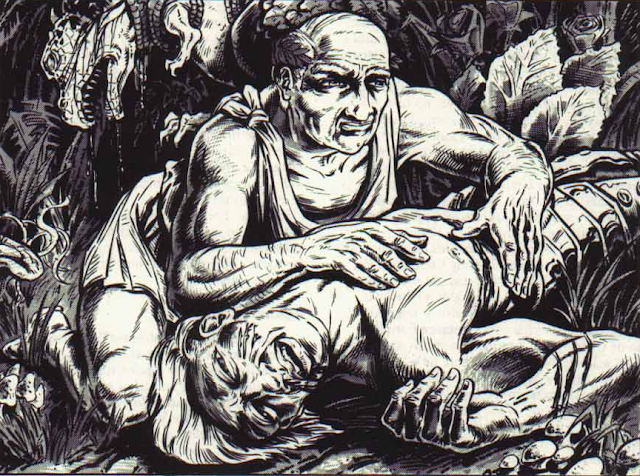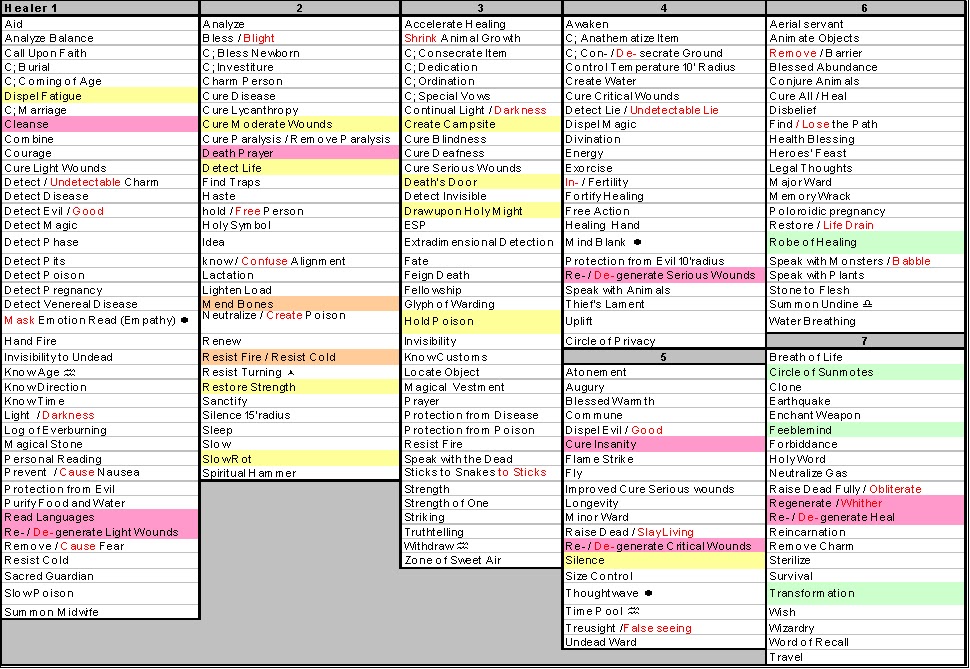
Healers
by Robin
Prime Requisite Wisdom
Experience Bonus -20% Wisdom 3-5
-10% Wisdom 6-7
+5%
Wisdom 13-15
+10%
Wisdom 16+
Hit Dice 1d6 per level up to 9tth level +1hp / level / Constitution adjustment.
Hit Dice 1d6 per level up to 9tth level +1hp / level / Constitution adjustment.
Starting with 10th level +1
hp/level Constitution
bonus no longer applies
Armor None.
Weapons No edged or pointed
weapons, all other permitted
Sometimes an Immortal will enforce a weapon, even if pointed (ex. Vanya
with swords), but other restrictions will apply.
Special Clerical
Spellcasting, Immortal granted ability, Turning Undead, special abilities.
Maximum Level: 36.
Healers, as the
name implies, are designed to allow rapid repair of other characters. The
Healer has therefore special abilities and special spells that allow them to do
this. No Healer can ever chance his class on his or her own volition. The
Healer has a special set of spells exclusive to his own class, but can Turn
Undead as a normal Cleric. Even in saves and hit roll they are equal to normal
clerics. In any not mentioned case use the cleric statistics instead.
Basic requirements
Minimum scores of
15 each in Intelligence, Wisdom and Dexterity.
Healers can only be Lawful or Neutral. A Chaotic Healer is not possible,
and when a Healer turns Chaotic due some magical effects he will turn out to
become a mere fighter with no abilities remaining to either c
-One
Knowledge Skill as: Knowledge of
Plants and Fungi
or
Knowledge of Diseases and Afflictions
or Knowledge of Races
-Alchemy
-One
Healing Skill as: Healing
or Veterinary Healing General
or
Veterinary Healing Specialized
-One
Profession Skill as: Chirurgy
or
Apothecary
or
Anatomy/Taxidermy
Later Skills may be
chosen from this list, but also other skills may be chosen. But only these
skills grant the Healer an extra bonus of 1 on the skill checks. All other
skills are penalized by 1, except knowledge skills.
Disabilities:
Healers can’t wear
any armor or shields, bracers, and as normal only one protection device.
The spells they are
able to cast can never be used in a harmful way, so a “Cure” spell can’t be
turned in to a “Cause” spell, etc..
Abilities;
Special abilities
are conferred upon the Healer at several abilities as according the following
table, any experience and Saves or hp are as per normal Cleric class.
Lay on Hands:
Cures 1d6+1 healing
points, but he can close only minor wounds of up to 7 damage, any wounds with
more damage will reopen with movement and the healing has failed completely
(except when rested for at least 1 day per 1+ Constitution bonus hit point
lost).
So the Lay on hands will cure several wounds completely as long as they do not exceed 7 points.
This ability doesn’t remove any other afflictions. So when a bear attacks a character with claws for 5, and 6 and bites for 8 damage, and hugs for 6, only one of the claw wounds can be closed, an attempt on the bite will stay closed it for as long as the patient doesn’t move or otherwise exerts himself.
The Hug damage will not be healed since this is crush damage and not a wound.
Thus it is also useless to do this on poisoned, sick, crushed, paralyzed creatures, since it cures only wounds.
The Healer can use this ability once per positive Wisdom adjustment point, even when he has no spells.
So the Lay on hands will cure several wounds completely as long as they do not exceed 7 points.
This ability doesn’t remove any other afflictions. So when a bear attacks a character with claws for 5, and 6 and bites for 8 damage, and hugs for 6, only one of the claw wounds can be closed, an attempt on the bite will stay closed it for as long as the patient doesn’t move or otherwise exerts himself.
The Hug damage will not be healed since this is crush damage and not a wound.
Thus it is also useless to do this on poisoned, sick, crushed, paralyzed creatures, since it cures only wounds.
The Healer can use this ability once per positive Wisdom adjustment point, even when he has no spells.
Detect Molds, Slimes
At 40’ distance the healer will be
able to detect the presence of slimes or molds by smell and sight of the
environment, but not the species.
Identify general type of potions
Identify the general type of magical effect of a potion by taste, smell,
viscosity, touch and color. But it doesn’t reveal what specific kind of potion
it is, only to what type it belongs.
The 5 Types are:
-Healing
(Any curing, Longevity):-
-Enhancers
(including Agility, Giant Strength,
Fly, Heroism, Fire Resistance, Clairaudience, Clairvoyance, ESP, Fortitude,
Levitation, Luck, Sight, Speech, Speed, Invulnerability, Strength, Swimming,
Treasure Finding ),
-Alterations
(including Blending, Defense,
Elasticity, Ethereality, Diminution, Merging,
Elemental or Gaseous form, Growth, Invisibility, Water Breathing.):-
-Controls (including; Dragon-, Animal-,
Human-, Undead-, Giant-Control, Dreamspeech):-
-Poisons
(includes bug repellant,
poisons, and antidotes).
Detect Disease and infections
The healer can
detect the presence of a disease in a patient, it’s direct living area, and
(DM) the whole nearby affected environment on sight or smell, only.) But this
doesn’t reveal what disease, a special healing skill check or spell and lots of
Time are needed to recognize diseases or infections.
Use Rods and Wands
The healer can from
now on use rods and wands usable only to Magic users with a 5% chance of
success/level above 16 (-2 per failed check, cumulative per try.). Any failure
will result in not being able to use the item at that moment.
Use 4 first level magic spells
The healer can now
learn to cast magic spells in addition to prayed spells (spellbook needed!!,
often the prayer book is used instead) on a successful Intelligence check and
tutoring (by a Mage of at least level 9) in the spells to be memorized. These 4
spells can never be exchanged for any other spells, and all four must be
learned at the same Time. This learning takes three times as long as a
magic-user would need to, with only half the chance of success, at double the
normal costs. This all due the difference in working with magical forces
between the two classes.
Some spells will be
made available to Healers at different levels of powers when they follow a
specific Immortal.
These spells can
only be extra spells if the description at the Immortal’s notes say so. Mostly
a spell will be made unavailable to the Cleric for the spell to become
available.
The Healer Spell list
All Aquatic based
Immortals or those with Clerics below water will chance the following spells:
Purify Food and
Water into Purify Food and Clear Water
Insect Plague into Shrimp Plague
Aerial Servant into Summon Undine
Earthquake into Sea Fury
Reversed spells can only be cast by Evil or
Chaotic casters, with only a few exceptions; Darkness,
Free Person, Barrier, Snakes to Sticks, and when the Immortal (in the
guise of the DM) allows it temporarily. Obliterate
and Slay Living can however be memorized and
cast at Undead creatures.
The Colors
and symbols used in the list have different meaning, as explained in the List
Legend.
Uncommon,
Rare and Very Rare spells are normally not found at the local Clergy, the percentages
given are the chance that a single specific temple knows this version of the
spell.
Elemental
spells (Energy, Matter, Thought, Time,) and Alignment spells (Good, Evil,
Chaotic, Nongood or Evil) can only be cast by those of the given immortal’s element
and alignment, often the cleric has to have this alignment too, to be able to
memorizeand cast the spell.
Aquatic and
savage coast spells can only be found in these regions and are a rare to very
rare or even completely unknown in any other areas.
Quest
spells are rarely granted by the Immortal, and then only when requested (the
cleric thus must have researched and found information about the spell) and the
immortal justifies the usage of the spell in the specific conditions the cleric
requires (sometimes, the immortal will give the cleric the spell requested, but
specifically forbids the usage elsewhere or when).



